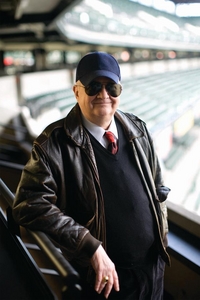 Tom Clancy’s success was the type for which every potential author dreams. Write a novel (THE HUNT FOR RED OCTOBER) that is accepted by the first publisher to which it is submitted. It becomes a bestseller, helped to some measure by the recommendation of the sitting President of the United States, and is adapted for film. If Clancy came out of nowhere, then we can define “nowhere” as the library where he spent months researching the incidents and hardware that formed the bedrock of THE HUNT FOR RED OCTOBER and his subsequent works. If you didn’t feel smarter politically, strategically and technologically after reading one of Clancy’s books, then you almost certainly skipped the good parts.
Tom Clancy’s success was the type for which every potential author dreams. Write a novel (THE HUNT FOR RED OCTOBER) that is accepted by the first publisher to which it is submitted. It becomes a bestseller, helped to some measure by the recommendation of the sitting President of the United States, and is adapted for film. If Clancy came out of nowhere, then we can define “nowhere” as the library where he spent months researching the incidents and hardware that formed the bedrock of THE HUNT FOR RED OCTOBER and his subsequent works. If you didn’t feel smarter politically, strategically and technologically after reading one of Clancy’s books, then you almost certainly skipped the good parts.
I always thought of Clancy as an “old guy.” I was amazed to find out, upon reading the first of the many notices of his sudden and much too early passing, that he was born merely four years ahead of me. Accordingly, I’ve had to modify my impression just a bit: Clancy was only a bit older than me, but, as I realized some time ago, he was a lot wiser. From the beginning, he demonstrated an ability to connect the dots in ways that few others could do. Actually, he did more than that: some of those dots were where most others saw a blank expanse. This ability earned him a visit or two from members of government agencies that were, shall we say, curious as to how information that was not exactly for public consumption wound up in his novels, particularly the early ones. Some of these elements were due to extrapolation, but many others were simply the result of knowing where to look, bringing a long-handled shovel, and getting to work, regardless of how deep and dirty he had to go. I’m not going to list all of the incidents that took place in his books that later came to pass. But I have to mention the biggest and most tragic. DEBT OF HONOR, published in 1994, eerily predicted the 9/11 terrorist attacks. Clancy saw them coming, as he did with so many things.
I’m not entirely sure that Clancy invented the technothriller, as he is so frequently credited with doing (anyone heard of Arthur C. Clarke or Ben Bova?), but there is no doubt that he took the genre to new nosebleed heights. I would also submit that he polished the bar to a blinding shine and raised it to nosebleed heights. He did that in part by getting his facts right, a practice built on a solid bedrock of persistence and hard work. If you’ve ever taken an author to task over a mistake in a novel, whether it be related to firepower or history or the fact that what we call “counties” are actually “parishes” in Louisiana, it’s at least in part because Clancy spoiled us.
Clancy was first and foremost an author, but he was also a brand, one of those very few people in any field of endeavor who could practically guarantee the success of a project by putting his name on it. We have novels and films and role-playing games that have directly and indirectly spun off from characters he created based upon the world in which we live, one in which there are neither 50 shades of grey nor the luxury of woolgathering about them. I believe there will be forms of entertainment we can’t imagine at this point that will someday bear his name and receive acclaim because of it. That, I would submit, is immortality. That is Tom Clancy.


